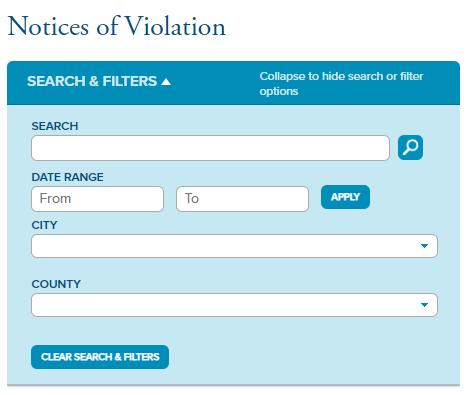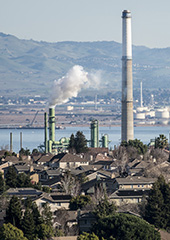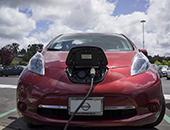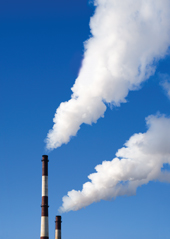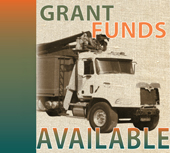|
|

|
|
|
|
November 2023 l Volume 2023-4
|
|
|
|
|
|
|
In this issue, you’ll find articles about the Air District's new web tool that displays searchable information about violation notices, the Air District’s disapproval of Fenceline Monitoring Plans submitted by the five Bay Area refineries and a recent agreement to close a Bayview Hunters Point sand and aggregate processing site at Pier 94. Other articles cover an Air District loan guarantee to a company making electric vehicles more affordable and a settlement agreement between the Air District and Communities for a Better Environment that will increase transparency and community participation in evaluating industrial health risk. Current grant opportunities are also summarized.
|
|
|
|
|
|
|
|
|
|
|
|
|
|
Air District Makes Air Quality Violation Information Available Online
|
|
| | |
|
This fall, the Air District launched a web tool that provides searchable information for all the notices of violation, or NOVs, that the agency has issued within the past five years. This new web tool allows the public to access enforcement information concerning NOVs issued to facilities across the Bay Area. It lists NOVs and related searchable information such as location, facility name, current enforcement status and penalty amount. The table will be updated daily, and this data can also be downloaded.
The Air District conducts comprehensive inspections to determine compliance with the agency’s rules, permit conditions and legal requirements, as well as applicable state and federal regulations. When the Air District discovers an air quality violation, it issues an NOV. In most cases, a facility can resolve an NOV by taking corrective action and paying a penalty. For significant penalties of $100,000 or more, the Air District notifies the public through press releases and email notifications.
The release of this web tool is supported by increased enforcement resources and coordination among stakeholders. The Air District is also actively seeking legislative remedies to increase the maximum penalties allowed by law.
|
|
|
|
|
|
|
|
|
|
|
|
Air District Rejects Fenceline Air Monitoring Plans for All Five Bay Area Refineries
|
|
| | |
|
In October, the Air District disapproved Fenceline Air Monitoring Plans for all five Bay Area refineries, because the plans do not meet the hydrogen sulfide monitoring requirements of the Air District’s Refining Emissions Tracking Rule. The Air District’s Refining Emissions Tracking Rule (Regulation 12, Rule 15) requires Bay Area refineries to operate fenceline air monitoring systems that measure specific pollutants that cross their property lines. The refineries must monitor, record and publicly report concentration levels of multiple compounds, including hydrogen sulfide. That monitoring is currently taking place, and the data is available to the public in near real time.
The refineries were recently required to update their monitoring plans to address requirements for monitoring hydrogen sulfide. Hydrogen sulfide is a colorless gas with the odor of rotten eggs; exposure to it can induce tearing of the eyes, headaches, nausea and vomiting.
Fenceline Air Monitoring Plans must include detailed descriptions of the equipment used for fenceline monitoring; the siting, operation and maintenance of that equipment; procedures for implementing data quality assurance and quality control; and procedures for reporting the measured pollutant concentrations. Following disapproval of the plans, the Air District will work with the refineries to make improvements in these areas.
Fenceline monitoring is one tool among many that the Air District uses to measure air pollutant concentrations and facility emissions. The Air District works to continually improve its emissions and air quality measurement programs, particularly for communities that are disproportionately impacted by air pollution. For more information about the fenceline monitoring program visit the Air District’s Fenceline Monitoring Plans web page.
|
|
|
|
|
|
|
|
|
|
|
|
Air District Forges Agreement with Martin Marietta to Close Pier 94, Pursues Pier 92 Abatement Order in Bayview Hunters Point
|
|
| | |
|
In October, the Air District announced that it had successfully secured a Closure Plan and Agreement with Martin Marietta, terminating operations at its Bayview Hunters Point sand and aggregate processing site at Pier 94. This action required Martin Marietta to cease all sand and aggregate processing operations by October 31 and to comply with dust control provisions until it vacates the site. The Air District is also seeking a conditional abatement order with the agency’s independent Hearing Board for a second Martin Marietta site at Pier 92. If granted, the facility will need to meet a deadline to comply with permitting requirements or be prohibited from operating. The facility will also be required to comply with interim operating conditions that minimize dust emissions and potential health impacts to those living in the surrounding community.
The sand processing plant at Pier 92 began operating under a certificate of exemption, but lost the exemption several years ago when it was owned by Martin Marietta's predecessor Lehigh Hanson. It has since been operating in violation of the Air District’s requirement that it have a permit to operate. Several factors, including continuous changes to the permit application, have delayed processing the application. Martin Marietta acquired the facility in October 2021. The matter will be heard in front of the Air District’s independent Hearing Board.
This closure agreement for Pier 94 sets the terms of the closure and requires the company to comply with dust control measures until it vacates the site. The enforceable dust control measures include watering stockpiles, a traffic speed limitation of 10 miles per hour on site, limited on-site travel lanes and stabilizing of inbound and outbound roadways to prevent dust emissions from roadways. A wheel wash station will be employed to clean truck tires and prevent dust emissions, and a sweeper truck will be employed for several hours a day during operations along the main roadways.
|
|
|
|
|
|
|
|
|
|
|
|
Air District’s Climate Tech Finance Program Funds Electric Vehicle Company Making EVs More Affordable For All
|
|
| | |
|
The Air District awarded a loan guarantee to EV Life, a startup working to eliminate the green premium on electric vehicles for millions of people who find the upfront cost of driving electric challenging. While the sticker price of an EV may initially be higher than that of a gas-powered vehicle, the cost of driving an EV is often lower, due to reduced fuel and maintenance costs. Although many EVs come with tax credits, rebates and other incentives, few incentives reduce the upfront cost of their purchase.
EV Life empowers consumers to discover and finance these incentives and helps lower their initial car payments through the EV Life Climate Loan. The loan can make financing an EV more affordable than a traditional gas vehicle, marking a significant milestone in the push for widespread clean energy adoption.
Unlike traditional auto financing, EV Life’s Climate Loan platform enables car buyers to apply for a loan and use their qualified tax credits and rebates upfront to lower payments by up to $200 per month, making financing an EV competitive with a gas car.
This loan guarantee is the most recent project under the Air District’s Climate Tech Finance program. In partnership with the California Infrastructure and Economic Development Bank and the Northern California Financial Development Corporation, the Climate Tech Finance team led a technology qualification, social equity impact and greenhouse gas analysis that deemed EV Life eligible for a multimillion-dollar loan guarantee. This loan guarantee supported the company in securing a line of credit with RSF Social Finance.
The core value of the Climate Tech Finance program is to support innovative climate projects and the Air District’s greenhouse gas analysis ensures that new technologies will reduce short- and long-term greenhouse gas emissions. EV Life’s forecasted growth is expected to reduce 30,000 metric tons of carbon dioxide equivalent emissions per year in California by helping residents switch from gas-powered to electric vehicles.
|
|
|
|
|
|
|
|
|
|
|
|
Air District and CBE Partner to Increase Transparency and Community Participation in Evaluating Industrial Health Risk
|
|
| | |
|
In September, the Air District and Communities for a Better Environment announced a settlement agreement that will enhance the agency’s Regulation 11-18 Facility Risk Reduction Program. This agreement will foster more transparency and community participation in the agency’s ongoing efforts to protect public health by reducing health risks from toxic industrial emissions. Under this agreement, Air District staff will work with CBE to revise its Implementation Procedures document through a public process that will include releasing the draft document for public review and comment and holding a public workshop for its discussion, according to a specified schedule.
The Air District Board of Directors unanimously adopted Regulation 11, Rule 18: Reduction of Risk from Air Toxic Emissions at Existing Facilities in November 2017. The regulation is considered the most health-protective toxic air pollution risk control measure in the nation and is intended to substantially reduce health risks from facilities that emit toxic compounds, such as petroleum refineries, sewage treatment plants and metal foundries.
Under Regulation 11-18, the Air District conducts site-specific health risk screening analyses for all Bay Area facilities that report toxic air contaminant emissions. From these analyses, the Air District can then compare and prioritize facilities based on the amount of toxic air pollution emitted, the toxicity of these pollutants and the proximity of these facilities to local communities. The Air District then conducts health risk analyses based on results of these prioritization analyses. Based on the potential health risk, facilities may be required to reduce their risk below the maximum allowable health risk level called “Risk Action Level” or install the best technology available for reducing toxic emissions on all significant sources of these emissions.
CBE’s suit alleged that the Air District did not provide sufficient community participation in the rule’s implementation.
To build better transparency with community members and advocates, Air District staff will provide additional information on the Air District’s website regarding the status of health risk reduction at the most impactful facilities, according to a specific timetable set forth in the agreement. Air District staff will also meet regularly with CBE and other community-based environmental justice organizations to discuss the implementation of this program and other issues of concern.
|
|
|
|
|
|
|
|
|
|
|
|
Air District Offers Millions in Grants
|
|
| | |
|
The Air District administers a number of grant funding programs that offer incentives for clean air projects. Grant Funding for Clean Air Projects
Grant programs for Bay Area businesses and public agencies:
- (Opening Soon) Heavy-Duty Mobile and Stationary Equipment Replacement and Zero-Emission Infrastructure Program - Funding will be available for projects that reduce toxic air emissions and ozone-forming pollutants through the scrap and replacement of older, high-polluting vehicles and equipment with cleaner alternatives, including zero emission equipment, vehicles, and supporting infrastructure. Funding will be prioritized for projects that operate in or that benefit areas that are most highly impacted by air pollution, including the AB 617-identified communities of West Oakland, East Oakland, Richmond-San Pablo, and Bayview Hunters Point/Southeast San Francisco, and other disadvantaged and low-income areas in the Bay Area. This program is scheduled to open by the end of 2023 and applications will be accepted on a first-come, first served basis. More information about eligible project categories and program requirements will be announced on the website and interested parties are encouraged to subscribe to email announcements at https://www.baaqmd.gov/funding-and-incentives/apply-for-funding to receive timely notice about program updates.
Funding is provided by the Carl Moyer Program, Community Air Protection Program, Transportation Fund for Clean Air, Goods Movement, Mobile Source Incentive Fund, and Funding Agricultural Replacement Measures for Emission Reductions (FARMER) program.
- Climate Tech Finance Loan Guarantee Program is available to support the development and purchase of climate technologies for small businesses in California. Climate entrepreneurs can apply for loan guarantees up to 80 percent of the loan principal or $5 million, whichever is less, to accelerate the growth and impact of their businesses. This program is open and accepting applications now. https://ctf.baaqmd.gov/
Grant programs available to Bay Area residents:
- Passenger Car and Light-Duty Truck Retirement – The Vehicle Buy Back Program pays Bay Area residents $1,200 per vehicle to turn in their operable, registered, model year 1998 and older passenger car or light-duty truck for scrapping, removing the highest-polluting passenger vehicles from the road. www.baaqmd.gov/vbb
- Clean Cars for All Program, Light-Duty Vehicle Replacement – The Clean Cars for All Program is open to income-qualified Bay Area residents in qualifying zip codes. The program provides grants of up to $9,500 to retire older, high-polluting vehicles and replace them with a new or used conventional hybrid, plug-in hybrid, fuel-cell, or electric vehicle. Residents that don’t want to purchase a replacement vehicle can receive $7,500 towards alternative mobility options (e.g. public transit or electric bicycles). www.baaqmd.gov/cleancarsforall
- Clean HEET Program – The Clean Heating Efficiently with Electric Technology (Clean HEET) Program provides funding to reduce costs for Bay Area homeowners to replace their existing, operational, freestanding wood stoves or wood-burning fireplace inserts with electric heat pumps. Individual awards range from $3,000 - $10,500 for one stove/insert, and $6,000 - $13,500 for two stoves/inserts. Funding is limited and applications received on time will be evaluated competitively, with priority given to projects in disadvantaged communities or meeting additional program priority criteria. https://www.baaqmd.gov/woodsmokegrant
Other state-wide grant programs funded by Volkswagen NOx Mitigation Trust (only the first is administered by the Bay Area Air District):
- VW Zero-Emission Freight and Marine Program – Funding is available statewide to accelerate the replacement of older, higher polluting diesel engines with zero-emission technology. Approximately $20 million in Volkswagen Environmental Mitigation Trust funding is available for projects that do one or more of the following:
- Scrap combustion-based airport ground support equipment and replace with all-electric,
- Scrap combustion-based heavy-lift forklifts (> 8,000 pounds of lift capacity) and replace with all-electric,
- Scrap combustion-based port cargo-handling equipment and replace with all-electric,
- Scrap combustion-based ferry, tugboat, or towboat engines and replace with all-electric, and/or
- Install portside shore power systems at berths for use by unregulated oceangoing vessels.
75 percent of funding will be awarded to projects that reduce emissions in California’s disadvantaged and low-income communities. This solicitation is open and accepting applications on a first-come, first-served basis. https://www.californiavwtrust.org/zero-freight-marine/
- VW Combustion Freight and Marine Projects – Funding is available statewide to accelerate the replacement of older, higher polluting diesel engines with the cleanest available technologies. Equipment eligible for replacement includes Class 7 and 8 freight trucks (including waste haulers, dump trucks, and concrete mixers) or their engines (2012 model year and older) that are compliant with current regulations; freight switcher locomotives or their engines (pre-Tier 1); and ferry, tugboat, and towboat engines (pre-Tier 3). This solicitation is open and accepting applications on a first-come, first-served basis until all funds are fully allocated. https://xappprod.aqmd.gov/vw/combustion.html
- VW Zero-Emission Class 8 Freight and Port Drayage Trucks - This category is intended to support the expansion of zero-emission truck availability in the heaviest weight class. Vehicles eligible for replacement include Class 8 freight trucks (including drayage trucks, waste haulers, dump trucks, and concrete mixers) or their engines (2012 model year and older). This solicitation is open and accepting applications on a first-come, first-served basis until all funds are fully allocated. https://xappprod.aqmd.gov/vw/zero-emission.html
- VW Zero-Emission Transit and Shuttle Buses – The second installment of VW funding is available to owners of bus fleets that operate in California to support early adoption of zero-emission bus technologies to reduce harmful exposure for the state’s most sensitive populations. This program is administered by the San Joaquin Valley Air Pollution Control District. The zero-emission school bus bin is now oversubscribed. This solicitation is open and accepting applications for transit and shuttle buses on a first-come, first-served basis until all funds are fully allocated. http://vwbusmoney.valleyair.org/
|
|
|
|
|
|
|
|
|
|
|
Air District Events
|
|
This winter, the Air District and Spare the Air will be participating in the following outreach events.
November through January
Christmas in the Park - San Jose
Nov. 24 - January 1 (the Air District booth will be there Nov. 25 and Dec. 3)
December
Holly Jollypalooza - Pacifica
December 9-10
|
|
|
|
|
|
|
|
|
|
|


